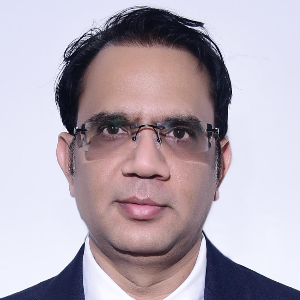Dr. Aditya Singh Bhati
MBBS, DNB - Neurosurgery, MNAMS, Fellow - Neuroendoscopy
 Neurosurgery
Neurosurgery
Dr Aditendraditya Singh Bhati) is an esteemed consultant in the field of global Neurosurgery and Spine Surgery, currently practising at Indraprastha Apollo Hospitals, New Delhi, India. He has done his Fellowship in Skull Base at Humanitas University, Italy followed by Extended Skull Base Fellowship from Weill Cornell Medicine, New York, USA. His special interests include Endoscopic removal of Skull Base tumours. He is specialized and trained in latest ZAP-X Radiosurgery from Swiss Neuro Radiosurgery Centre, Switzerland for treatment of brain lesions. He aims to achieve maximum symptom relief with minimum discomfort, along with early mobilization.
Sector B-8, 6001, Near GD Geonka School, Vasant Kunj, Delhi, Delhi, India, 110070
- Delhi, Delhi
- DocIndia Verified
- 7 Award
- 1000
- Brain And Spine Clinic + 1 More
Dr. Amitabh Goel
MBBS, MS - General Surgery, MCh - Neuro Surgery
 Neurosurgery
Neurosurgery
Dr Goel completed his MCh in Neurosurgery from SGPGI Lucknow in 1996 and was then with leading corporate hospitals in NCR. He is presently Director Neurosurgery at Max Hospital Patparganj in East Delhi. His interest in the field of Neuroendoscopy (for Brain & Spine) started in 1998 and since then he has been regularly practicing this art. He was the first one to present endoscopic removal of pituitary tumors from north India at the Asia Oceania Skull base conference held way back in 1999. He has been delivering lectures on the art and science of Neuroendoscopy all over the country since then. He has to his credit chapters in emergency medicine textbooks on Vascular Neurosurgery and Subarachnoid hemorrhage and several publications in indexed journals. He has a keen interest in the promotion of neurosurgery as science and conducts regular workshops and CMEs.
108 A, Indraprasth Extension, Delhi, Delhi, India
Dr. Dhruv Chaturvedi
MBBS, MS - General Surgery, MCh - Neuro Surgery
 Neurosurgery
Neurosurgery
Dr. Dhruv Chaturvedi MBBS, MS (General Surgery), MCh (Neurosurgery) is one of the leading and eminent neurosurgeons in Delhi. He has done his training in Neurosurgery at the esteemed All India Institute of Medical Sciences. In addition to this, he has had an extensive training in various brain and spine surgeries various international centers, including Germany UK and Singapore. He has also attended and actively participated in various workshops in cranial and spinal surgeries. He has worked at various reputed hospitals including Max Hospital, Fortis Hospital, and Indian Spinal Injuries Center. He has a wide experience of various Brain And Spine surgeries. He is one of the very few neurosurgeons in India who have a unique expertise of endoscopic brain and spine surgeries. He has a keen interest in Brain Tumor Surgery, Vascular Surgeries, Pediatric Neurosurgery, DBS and various complex Spine Surgeries including minimally Invasive Spine Surgeries.
Press Enclave Marg, Sheikh Sarai Phase II, Delhi, Delhi, India
Dr. Vimal Kumar Agarwal
MBBS, MS - General Surgery
 Neurosurgery
Neurosurgery
Dr. Vimal Kumar Agarwal is a Neurosurgeon and General Surgeon and has an experience of 21 years in these fields. He completed MBBS from University of Delhi in 1998 and MS - General Surgery from University of Delhi in 2003.
Delhi, Delhi, India
Dr. Bipin S. Walia
MBBS, MS - General Surgery, MCh - Neuro Surgery
 Neurosurgery
Neurosurgery
Dr. Bipin S. Walia is a Neurosurgeon He completed MBBS from Armed Forces Medical College (AFMC), Pune,MS - General Surgery from Armed Forces Medical College (AFMC), Pune and MCh - Neuro Surgery from All India Institute of Medical Sciences, New Delhi.
Delhi, Delhi, India
Dr. Sanjeev Dua
MBBS, MS - General Surgery, MCh - Neuro Surgery
 Neurosurgery
Neurosurgery
Dr. Sanjeev Dua is a Director – Neurosurgery at Max Super Healthcare, Patparganj and Vaishali. He completed his MBBS and MS-surgery from the same institution, KGMC, Lucknow and was awarded Gold Medal for ranking First in MS. Later, he pursued M.ch from the same institute to further expand his specialization in neurosurgery. Dr. Sanjeev Dua also underwent Fellowship at International Neurosurgical Institute, Hanover, Germany. Dr. Sanjeev is a very outgoing doctor who engages himself in various academic workshops and conferences to share his knowledge and to keep himself updated with the advancement in the medical field. He is also an invited speaker at National and International conferences, has lectured in scores of CME programs and has given guest orations at varied Academic Forums including several on Nanotechnology. He has also conducted cadaveric and live workshops on Minimal Access Spine Surgery and held several executive posts in various academic societies. Over the years, Dr. Sanjeev has acquired special interests in Comprehensive Management of all Spine related disorders, Minimal Access Spine surgery and Endoscopic Neurosurgery.
108 A, Indraprasth Extension, Delhi, Delhi, India
Dr. Sanjeev Gupta
MBBS, MS - General Surgery, MCh - Neuro Surgery
 Neurosurgery
Neurosurgery
Dr. Sanjeev has more than 20 years of experience in Neurosurgery. His surgical and clinical expertise cover the Entire spectrum of brain and spine diseases. Before joining Max Hospital, he was heading the department of neurosurgery in 1000 bedded teaching Hospital(University College of Medical sciences and GTB Hospital) in New Delhi.
Delhi, Delhi, India
Dr. Rajesh Acharya
MBBS, MS - General Surgery, MCh - Neuro Surgery
 Neurosurgery
Neurosurgery
Dr. Rajesh Acharya is a Neurosurgeon in Old Rajendra Nagar, Delhi and has an experience of 35 years in this field. Dr. Rajesh Acharya practices at Sir Ganga Ram Hospital in Old Rajendra Nagar, Delhi. He completed MBBS from University of Rajasthan, Jaipur in 1986,MS - General Surgery from University of Rajasthan, Jaipur in 1989 and MCh - Neuro Surgery from SANJAY GANDHI POST GRADUATE INSTITUTE OF MEDICAL SCIENCES, LUCKNOW. in 1997. He is a member of Delhi Medical Council.
Sir Ganga Ram Hospital Road, Delhi, Delhi, India
Dr. Arun Saroha
MCh - Neuro Surgery, MBBS
 Neurosurgery
Neurosurgery
Dr. Arun Saroha is the famous Neurosurgeon practices in Max Super Specialty Hospital, Saket. He has graduated and post graduated from Rabindranath Tagore Medical College, Udaipur and done his M.Ch in Neuro Surgery from Postgraduate Institute of Medical Education & Research (PGIMER), Chandigarh. Dr. Saroha has honoured with many prestigious awards in the field of neurosurgery. One of them is the Spine Surgeon award by Big Research Awards. He has participated in various Symposium and Workshop and has attended various National and International conferences. Dr. Saroha is the member of many prestigious organisations in the field of Neurology and spine surgery across India and USA. He is associated with many social organizations for providing free treatment to poor patients. He has expertise in various domains of Neuro Surgery and Spine Surgery. He provides consultation for Degenerative Spine Disorders, Brain Tumors, Disc Replacements and Complex Spine Fixation. He has a vast experience of 13 years of working with some of the Neurosurgical hospitals like VIMHANS, Paras Hospital and Artemis Hospitals, Presently, he provides his services in Max Hospital, Gurgaon and Saket. Dr. Saroha with his team offers comprehensive care for all types of neurological problems. He has a passion to improve quality of life of patients who are suffering from brain & spine problems and through his skills and knowledge he provides them the possible treatment. He has a large number of patients coming from across the world.
1&2, Press Enclave Road, Saket, Hauz Rani Bus Stop, Delhi, Delhi, India
Dr. Varinder Paul Singh
MBBS, DNB - Neurosurgery
 Neurosurgery
Neurosurgery
Dr. Varinder Paul Singh is a Neurosurgeon and has an experience of 33 years in this field. He completed MBBS from Aiims in 1982,M.Ch - Neurosurgery from Aiims in 1987 and DNB - Neurosurgery from National Board Of Examination in 1989.
Delhi, Delhi, India
1.How can Doc India neurosurgeons be beneficial?
In Doc India, neurosurgeons can help you to recover from various types of neuron-related problems through surgical methods and using their experiences and high expertise can help you to recover faster.
2.Are neurosurgeons in Doc India successful in surgery?
Visit the Doc India website, one of the best health care websites in India to check the success rate and the client’s feedback of the best neurosurgeons in Delhi.
3.What is the difference between a neurologist and a neurosurgeon?
A neurologist is a doctor who specializes in the diagnosis, curing, and management of brain and nervous system and various types of diseases that occur. On the other hand, a neurosurgeon is an expert who performs the surgeries related to neuron disorders.
4.What are the risks of open neurosurgery?
One of the major risk factors of undergoing an open surgery is that the patient might develop side effects due to anesthesia medicines, and may also have bleeding, blood clots, and infection. While these risks are relatively low, they can occur and may require additional medical intervention.
5.Why are MRI s required before performing neurosurgery?
MRI s are required as methods of screening or diagnosis before performing neurosurgery, so that if there are any kind of problems, that would be taken in account before the surgery occurs.
6.Would your neurosurgeon prefer surgery for brain tumor?
Primarily, your neurosurgeons would prefer to conduct necessary medical tests to find out the current medical conditions of the brain tumor and then might advise you to undergo partial or complete surgery accordingly.
7.Why is blood clot removal important in neurosurgery?
In case of formation of blood clots near the brain, your neurosurgeon must remove them because blood clots might lead to several severe conditions like thrombosis, which will further complicate the surgical methods.
8.Why is spinal fusion required in neurosurgery?
The spinal fusion surgery is required to join two or more vertebrae in your spine (backbone). This surgery is also important to treat pain, numbness, muscle weakness and various other neuron-related problems.
9.What are the long-term side effects of neurosurgery?
The major risk behind neurosurgery is that of temporary or permanent neurological deficits because a neurosurgery often involves delicate manipulation of neural tissues. The other risks include post-operative complications, during which you should always consult your neurosurgeon for necessary assistance.
10.Is epilepsy surgery advised for all epilepsy patients?
In many cases, neurosurgeons may advise patients to undergo epilepsy surgery, especially when you have acute epilepsy because such a surgery will help to stop epileptic seizures. But the recommendation of the surgery will depend entirely on the patient’s condition and is not for everyone.
Also Check- Top Cardiologists in Delhi | Top 10 Endocrinologist in Delhi | Top 10 Cardiac Surgeon in Delhi | Top 10 Nephrologist in Delhi | Top 10 Ayurveda Doctors in Delhi | Top 10 Dermatologist in Delhi | Top 10 Gynecologist in Delhi | Top 10 Neurologist in Delhi | Top 10 Neurosurgeon in Delhi


